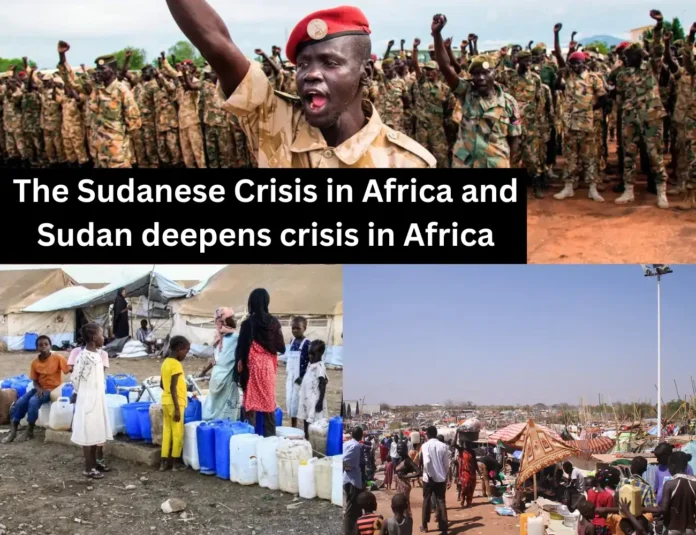Sudanese Crisis
The political danger, ethnic divisions, economic differences, and funds conflicts have plagued the African country of Sudan for decades. As stated by Chuol (2023), this essay’s goal is to value the potential role of the African Union in resolving the conflict; examine the role of a country as a bridge builder; investigate the interest of the Wagner Group; and discuss the consequences of the war in Africa.
The ethnic lines that divide Sudan go back far into the country’s past. Different ethnic groups in the country pursue different cultural and political agendas. Conflicts and tensions were fueled by these differences, and in 2011 Sudan split into the countries of Sudan and South Sudan.
- For decades, Sudan has been unable to build a stable overall government due to political imbalance and governance challenges such as coups, inflexible rule, and power struggles.
- Both economic imbalance and misallocation of resources have played significant roles in prolonging the crisis in Sudan.
- Sudan has rich oil, mineral, and farming resources. Unfortunately, this wealth has been spread unequally, leading to spite and strife.

Violence has broken out in undeveloped areas like Darfur because of funds exploitation and neglect. There are many major players and warring groups in the Sudanese conflict, all of whom have their own agendas and goals. Militias and government forces both play important roles on one side of the conflict, helping to keep the peace and crush the rebels.
Rebel vs. State
Conversely, rebel organizations and political resistance groups aim to achieve greater freedom or a shift in political power by strongly opposing the state. The conflict is further deteriorating by the engagement of bordering countries, which may support certain teams or intervene to protect their own interests.
- The civil war in Sudan has had far-reaching effects across Africa. To begin, it has activated a major unselfish crisis, leading to a broad shift of nationals and having a serious effect on their safety, security, and ability to make a living.
- Second, the conflict has increased local tensions and added new security concerns, with effects on neighboring countries. Due to the violence, investment, trade, and growth in neighbouring countries have all been affected.
- The African Union (AU) has been important in attempts to bring the Sudanese crisis to a close. Among the objectives of the AU is to provide safety and security throughout the African continent. The organization handled negotiations between Sudan’s conflicting sides and dispatched soldiers.
To effectively deal with the Sudanese situation, the African Union (AU) faces a number of important difficulties and limitations. Due to the nature of the disagreement, the conflicting interests of both sides concerned, and a lack of assets, achieving long-term peace is challenging. A fair third party in the Sudanese conflict can help bring the parties together. ” Peace talks between warring parties can be successful by the diplomatic efforts of the African Union (AU) organization. “

Rebuilding Infrastructure
The nation as a whole can help discussion and mediation between competing groups in an effort to heal old wounds and foster new bonds of cooperation. Rebuilding infrastructure, encouraging economic growth, and making sure that marginalized groups are getting opportunities are all ways in which a country that is good at building bridges can aid in post-conflict reconstruction.
The Sudanese crisis can get a solution forever with the help of a country that acts as a bridge builder by growing trust and opening channels of communication. There is a theory that Russian private military firm Wagner Group is taking part in the conflict in Sudan. The organization is shameful for providing military aid to both state and non-state actors in several different conflict zones.
Concerns about the dynamics of the conflict in Sudan are increasing by its alleged involvement in the fighting there. The conflict can become more volatile if these outside parties are part of it. More openness and responsibility in the handling of the Sudanese crisis is a need of the hour. Solving the crisis in Sudan calls for creative thinking and strategies that will last.
It is imperative that conflicting parties find common ground through diplomatic negotiations and peace treaties. Security and speed for peace procedures can get support from international agencies, such as mediation missions. It’s also important to deal with basic problems with governance, economic differences, and racial tensions that are fueling the conflict. Promoting overall governance, addressing economic inequalities, and ensuring the participation of all stakeholders is crucial for maintaining long-term stability and peace in Sudan.
African crisis
The African crisis in Sudan is described by ethnic divisions, political instability, economic variations, and resource conflicts, all of which supply the crisis’ complexity and varied nature. Government forces, rebel groups, and neighboring countries are all major players and contributors to the conflict’s length. The Wagner Group and other outside players further complicate the situation.
Sudan has the potential for solution and stability despite these challenges. Opportunities for long-term solutions can be through a country’s role as a bridge-builder, in diplomatic negotiations, in international noise, and in addressing root causes. However, lasting peace requires not only international and regional cooperation but also the commitment of all parties involved. The only way the crisis in Sudan will get a long-term solution and a peaceful and prosperous future for the country can be built if all parties involved work together.





